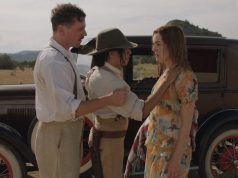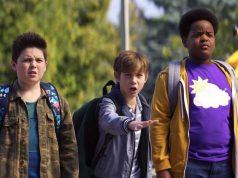“Up With Me” is proof that you can make a good film out of old ideas. All it takes is a different approach, some reinvention to give the familiar themes a new twist. In fact, the only real shortcomings in “Up With Me” occur when the film tries too hard to be creative. As backward as it may sound, the film is at its best when it sticks to the situation that we’ve seen a thousand times before, for the simple reason that its technique gives it new life.
The film was created by the East Harlem Tutorial Program, with non-actors filling the roles and a do-it-yourself mentality governing every aspect of it. Written by Maeve McQuillan and Greg Takoudes (with help from some of the kids) and directed by Takoudes, it’s about a kid from Spanish Harlem named Francisco (Francisco Vicioso) whose academic excellence has earned him a scholarship to a fancy upstate prep school. His girlfriend, Erika (Erika Rivera), misses him, knows it will be good for him, and frets that they will be divided by his new education. His best friend, Brandon (Brandon Thorpe), on the other hand, is openly bitter about Francisco’s departure, seeing it as a betrayal in the immature way that teenagers see everything as a betrayal.
At the prep school (which we don’t see until the film is half over), Francisco is a novelty and a curiosity who isn’t expected to do well. On his visits home, his time is split between Erika and Brandon, with each party convinced he’s neglecting them in favor of the other. Francisco is a young man torn in at least three different directions, and at no point does anyone consider what’s best for him, personally.
The scenario is familiar. We have seen movies about street kids seeking to improve their lives before. We know from experience that Brandon will be a troublemaker and that Francisco will try too hard to please everyone. Nothing about the basic story of “Up With Me” is groundbreaking.
What’s innovative is the way the story is told. With hand-held cameras, natural lighting, and honest, unforced performances, the film has a level of intimacy and realism that could not have been achieved with famous actors and shiny production values. Even if you didn’t know that these were non-professional actors who really do live in Harlem, you’d sense it when you watched them. An early scene of Erika and her two girlfriends gabbing about their love lives is so charmingly unaffected and funny that it could pass for a documentary. Even the best actors can’t fake that kind of genuine teenage exuberance and delivery.
Takoudes and McQuillan’s concession to traditional cinematic form is to have Erika narrate the film in eloquent, poetic language. Her description of her life and her love for Francisco has a dreamy quality that injects artfulness into a film that otherwise tends to avoid anything lofty — and the combination works beautifully. Her daily life might be ordinary and earthy, but her thoughts are sublime.
Unfortunately, the film takes some turns in its second half that damage its carefully laid foundation. Francisco, Erika, and Brandon become entangled with dangerous thugs over a $500 debt one of them owes, and the way that storyline plays out is conventional, as if this were just another urban street drama. I almost think the film would be better without any particular “storyline” at all. It’s most effective when it focuses on the three characters and their relationships and struggles, not when it’s hammering away at a convoluted plot.
B (1 hr., 16 min.; )





